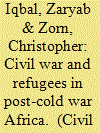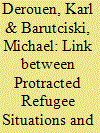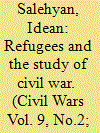|
|
|
Sort Order |
|
|
|
Items / Page
|
|
|
|
|
|
|
| Srl | Item |
| 1 |
ID:
077772


|
|
|
|
|
| Publication |
2007.
|
| Summary/Abstract |
Violent conflict causes millions of people to flee their homes every year. The resulting displacement crises not only create logistical and humanitarian nightmares, these crises threaten international security and risk the lives of displaced people, aid workers, and peacekeepers. Despite the dangers posed by conflict-induced displacement, scholars, policy makers and international organizations usually have only a partial understanding of these crises. Conflict-induced displacement consists of two main factors: 1) The violence that caused the displacement and 2) The characteristics of the resulting displacement crisis. Many observers fail to disaggregate each factor; rather lumping all types of violence together or viewing displaced people as an undifferentiated mass. This paper demonstrates that disaggregation of both concepts-causes of conflict-induced displacement and characteristics of a crisis - is necessary to understand fully the importance of displacement in international politics. The paper develops typologies to analyze those concepts and discusses the implications for future research on conflict-induced displacement.
|
|
|
|
|
|
|
|
|
|
|
|
|
|
|
|
| 2 |
ID:
077775


|
|
|
|
|
| Publication |
2007.
|
| Summary/Abstract |
One inevitable by-product of large-scale civil conflict is the displacement of individuals, either voluntarily or by force. That fact has been a cornerstone of the international community's involvement in civil conflicts, which has increased markedly since the end of the Cold War. Yet few studies have investigated empirically the connection between such conflicts and the occurrence and extent of forced migrations, and none have evaluated whether the ongoing international response has been effective in breaking the link between civil war and forced migration. We thus begin with the goal of assessing whether and the extent to which the effect of civil wars on volumes of refugees has declined since the end of the Cold War, chiefly due to international efforts to mitigate the conditions that facilitate civil conflict or enhance its detrimental effects. We present a model of refugee flows that accounts for the influence of spatial, domestic, and international factors on those movements, and which allows for the possibility of both temporal variation in the influence of civil wars on those flows and prospective and retrospective temporal dependence in those flows. We go on to evaluate our expectations empirically, using data on refugee movements in Africa during the period from 1992 to 2000. Our findings suggest that the effect of civil wars on forced migration has been steadily declining during those years, a result consistent with the greater levels of international intervention in those conflicts during the period
|
|
|
|
|
|
|
|
|
|
|
|
|
|
|
|
| 3 |
ID:
077776


|
|
|
|
|
| Publication |
2007.
|
| Summary/Abstract |
Most of the refugees in the world today are mired in protracted refugee situations (PRS). While PRS around the world last for years with no apparent solution on the horizon, the problem is especially prominent in Africa where traditional refugee protection approaches and solutions are not working. This study applies an innovative framework recently developed to study civil war to the analysis of PRS. The enduring rivalry framework was developed for studying the long-term dynamics of serious conflicts between pairs of states. By applying this framework to rivals in civil wars, this study presents a new way of thinking of PRS by tracing the problem back to the enduring internal rivalries that cause and sustain them.
|
|
|
|
|
|
|
|
|
|
|
|
|
|
|
|
| 4 |
ID:
077774


|
|
|
|
|
| Publication |
2007.
|
| Summary/Abstract |
This study predicts forced migration events by predicting the civil violence, poor economic conditions, and foreign interventions known to cause individuals to flee their homes in search of refuge. If we can predict forced migration, policy-makers can better plan for humanitarian crises. While the study is limited to predicting Haitian flight to the United States, its strength is its ability to predict weekly flows as opposed to annual flows, providing a greater level of predictive detail than its 'country-year' counterparts. We focus on Haiti given that it exhibits most, if not all, of the independent variables included in theories and models of forced migration. Within our temporal domain (1994-2004), Haiti experienced economic instability, low-intensity civil conflict, state repression, rebel dissent, and foreign intervention and influence. Given the model's performance, the study calls for the collection of disaggregated data in additional countries to provide more precise and useful early-warning models of forced migrant events
|
|
|
|
|
|
|
|
|
|
|
|
|
|
|
|
| 5 |
ID:
077771


|
|
|
|
|
| Publication |
2007.
|
| Summary/Abstract |
This introduction examines the current literature on refugees and civil conflict. Rather than treating refugees as the unfortunate victims of conflict and the by-product of war, recent literature places forced migration squarely within the study of political violence. While humanitarian issues are certainly significant, refugees are also important political actors who play an active part in conflict dynamics. Three themes are considered here: conflict as a cause of forced migration, forced migration as a cause of conflict, and policy responses to refugee flows. This contribution also outlines promising areas for future research and introduces the articles in this special issue
|
|
|
|
|
|
|
|
|
|
|
|
|
|
|
|
| 6 |
ID:
077773


|
|
|
|
|
| Publication |
2007.
|
| Summary/Abstract |
Civil war and other forms of generalized violence have been identified as the main determinants of forced migration. Yet, there are still large variations across armed conflicts that have not been accounted for. In this article we examine new measures of armed conflict that indicate the magnitude and scope of fighting. We find that the geographical scope of fighting and the extent to which urban centres are affected determine a significant portion of the variation in the expected number of forced migrants across conflicts. Contrary to our expectations, our results show that the intensity of the armed conflict is not significantly related to the number of forced migrants. These findings suggest that the threat perceived by potential forced migrants is more related to where the fighting is taking place, than to the overall intensity of the fighting
|
|
|
|
|
|
|
|
|
|
|
|
|
|
|
|
|
|
|
|
|